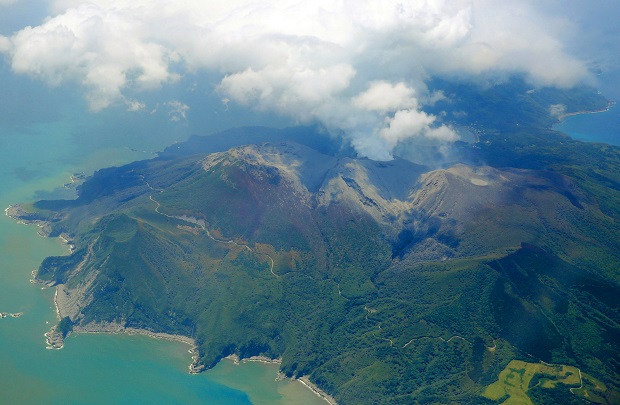Volcano erupts in southern Japan, spewing ash high into sky

A column of smoke raises from Mount Shindake on Kuchinoerabu island, southern Japan, Friday, May 29, 2015. (Kyodo News via AP)
TOKYO — A volcano erupted in spectacular fashion on a small island in southern Japan on Friday, spewing out rocks and sending black clouds of ash 9 kilometers (5.6 miles) into the sky. Authorities told people on the island to evacuate.
One person was reported to have suffered minor burns from falling debris after Mount Shindake erupted about 10 a.m. (0100 GMT), sending dense pyroclastic flows of rock and hot gases seaward, the Japan Meteorological Agency reported.
The injured man and one other person who was feeling unwell were airlifted to nearby Yakushima island, the Fire and Disaster Management Agency said.
Another 133 people were evacuated on a Coast Guard vessel and town-operated ferry and fishing boats.
The agency raised the volcano alert level for Kuchinoerabu island, where Shindake is located, to five, the highest on its scale. Shindake also erupted in August last year for the first time since 1980.
Article continues after this advertisementA military helicopter was sent to survey the island and assess damage.
Article continues after this advertisementNobuaki Hayashi, a local village chief, said about 120 of the island’s 137 residents were gathered at an evacuation facility.
“There was a really loud, ‘dong’ sound of an explosion, and then black smoke rose, darkening the sky,” he told the national broadcaster NHK. “It smelled of sulfur.”
Hayashi said a few people on the island were still unaccounted for. One person, who lives in an area that is generally off-limits, was to be evacuated by boat as he could not travel safely to the shelter by land.
“The skies here are blue, but smoke is still rising to the west,” he said.
Kuchinoerabu is 50 miles (80 kilometers) southwest of Japan’s main southern island of Kyushu. A heavily forested, mountainous island bordered mostly by rocky cliffs, it is a national park supported mainly by tourism and fishing.
About two hours after the eruption, footage from NHK showed the mountain shrouded in light gray ash as the clouds from the eruption cleared.
Kuchinoerabu usually can be reached only by a once-a-day ferry from Yakushima, 12 kilometers (about 7 miles) to the east, which has an airport and a population of more than 13,000 people.
Japan, which sits atop the Pacific “Ring of Fire,” has dozens of volcanoes and is frequently jolted by earthquakes.
In March 2011, a magnitude-9 earthquake rocked northeastern Japan, triggering a tsunami that killed more than 18,500 people and ravaged much of the northern Pacific coast.
Authorities recently closed part of a popular hot springs about 80 kilometers (50 miles) from Tokyo because of fears of an eruption from Mount Hakone, which is southeast of Mount Fuji.
The eruption last September of another volcano, Mount Ontake in central Japan, killed 57 people.
Setsuya Nakada, a professor at Tokyo University, told NHK that the eruption on Kuchinoerabu was stronger than Mount Ontake’s.
Since the 2011 disasters, “this sort of activity has continued,” Nakada said, when asked if more eruptions were likely on the island. “Probably the eruptions will continue.”